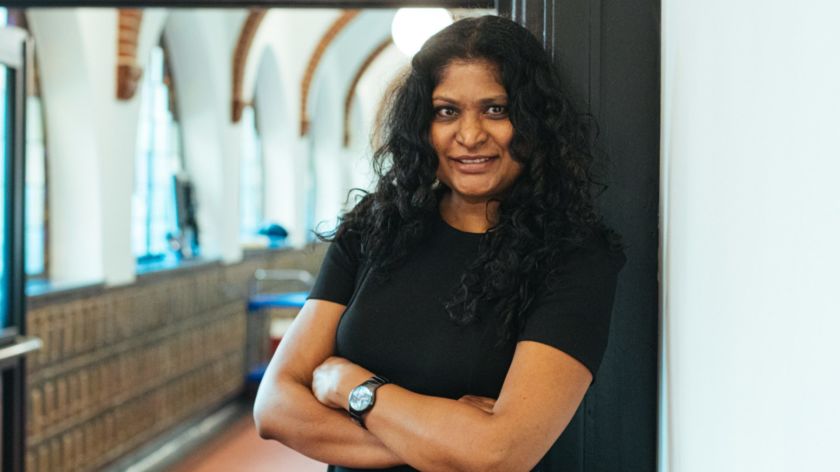First Diversity, Equity and Inclusion Strategist: ‘I am an advocate of social justice’
-
 Rona Jualla van Oudenhoven. Foto: Marjolein van Diejen
Rona Jualla van Oudenhoven. Foto: Marjolein van Diejen
For the first time ever, Radboud University has hired a Diversity, Equity and Inclusion Strategist. Rona Jualla van Oudenhoven has Indian roots, she grew up in Trinidad and Tobago and worked in Canada. 'With this new, official position, the university can show its willingness to grow in and focus on this topic.'
‘I am Rona. I come from Canada. I live in Leiden. I work in Nijmegen.’ With considerable fluency, Rona Jualla van Oudenhoven speaks the sentences that she has learned so far on her Dutch course. Rona arrived at the end of August to start her new job–Diversity, Equity and Inclusion Strategist – in September. Van Oudenhoven has Indian grandparents and grew up in Trinidad and Tobago.
‘The idea is for me to develop a change strategy’, Van Oudenhoven continues, in her native English. ‘Of course, such a strategy must be aligned with the university’s mission. So, how can we create a safe and inclusive space for everyone? We will need to come up with different strategies for different groups. I will start by talking to students, university staff members and any other interested parties, because first I have to understand what people’s needs are.’
You are the first Diversity, Equity and Inclusion Strategist at this university. Why now?
‘The issue has always been on the agenda, and I can see that it is something that the student organisations have worked on, while the Personnel Department is also focusing on inclusion and diversity. With this new, official position, the university can show its willingness to grow in and focus on this topic. I was also really pleased that, on my first day of work, the Dutch government launched an action plan for diversity and inclusion; something that I will certainly be incorporating into my work.’
Why is more diversity good for a university?
‘The world is changing, and we are increasingly part of a global village. It therefore makes sense for an organisation to examine its actions and to attempt to adapt to the global setting. If not, it will stagnate. Diversity has also received a lot of political attention recently, and topics that were previously not talked about, now suddenly are. Take, for example, the Black Lives Matter movement. Look, discrimination has always existed, whether it’s racial discrimination or discrimination based on gender. The difference is that now we are talking about it.
‘Very often, people’s fear of other groups in society is unfounded. People see others as a threat because they are worried that something is going to be taken away from them. You need to understand how that mechanism works before you can try to change things, and that requires diplomacy. You need to explain that the majority does not have to forfeit anything for a minority group to have the same opportunities. It is not a case of taking water out of one bucket and pouring it into another, so that the first has less. You are not favouring any one group over another. No, what you are trying to do is to make sure that the groups that are discriminated against are able to have the same as the majority. Education is a great example. After all, the fact that I go to school too does not mean that your diploma is worth less.’
Is the point for the university to set an example, or will a more diverse campus really bring about improvements?
‘Both. The university is a micro-society. We need to develop, and to recognise that we have a large influence as a university; that we serve as an example and that we influence others. We need to accept that role. At the same time, research shows that diverse teams achieve better results than homogeneous teams. It therefore makes sense to use that diversity in people’s ways of thinking. You should also not forget that the new generation of students is incredibly open-minded. All students, whatever their colour or orientation, want to study at a university that demonstrates that it is paying attention to such topics.’
What will you focus on? Is the aim to attract more ethnic minorities, or more women?
‘That is a little too simplistic. I first need to get to know the organisation and to get a feel for how it works. I also need to find out what exactly is needed. Once we are in the position of drawing up an action plan for diversity, equity and inclusion, it is very possible that we will state these kinds of aims.’
Do you support quota, for example to attract more women to top positions?
‘I do not oppose them, as sometimes these kinds of measures are needed to effect change. However, it is really still too early to say anything about that. First, I need to draw up a strategy.’
Do you support the global call for the ‘decolonisation’ of university curricula?
‘I believe that a curriculum should be a reflection of reality and everyday life. If decolonisation of the curriculum means that you come closer to that reality, and that you better reflect society, then I support that. I grew up in Trinidad and Tobago, and at school we read Tolstoy, Shakespeare and European philosophers, but also Caribbean writers. You could call that a decolonised curriculum and, thanks to that mix, I have a balanced view of the world, which I have benefitted from.’
What is it that makes you enthusiastic about your new job?
‘I have worked in this field for 15 years, and the mix of education (Van Oudenhoven is a professor, ed.), policy, research and training interests me. Being able to contribute to change, even if it is in a small way, is what makes me happy. After all, I am an advocate of social justice.’



